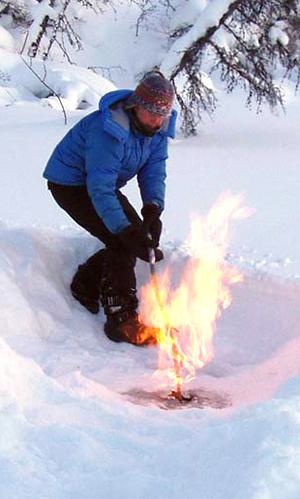 |
|||||
Global Warming Truth-Home » Global Warming
»
|
|||||
Global Warming
The above statement was made by Jay Zwally after the 2007 NASA satellite data revealed the Arctic ice had melted much more than expected. The amount of ice remaining at the end of summer 2007 was the lowest on record, being 50% below the levels measured in 1979. The image below demonstrates. 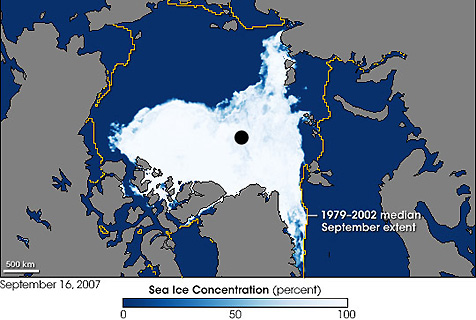 Arctic Sea Ice Concentration in Summer 2007 compared to 1979 The earth is approaching an ecological tipping point that could see global warming spiral out of control unless urgent actions are taken. Global warming is not a linear process given the extremely complex nature of the earths' ecosystem. There exists many 'feedback loops', which could greatly accelerate the warming process of the earth over the next few years. 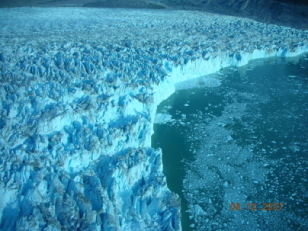 Rapidly Melting Greenland Ice Sheet - Summer 2007 The Arctic ice is like the canary of the planet.Owing to its extremely cold climate, it is highly sensitive to global warming and has been showing signs lately of rapid melting. This should come as a serious concern to every citizen and government of the earth, as this planet is our home, and extinctions of 90% of life on the planet has happened before, and it could happen again.What could cause a mass extinction?The Arctic ice plays many important roles in the stabilization of the earths climate including the regulating of the oceans currents (as explained in Al Gore's 'An Inconvenient Truth') and the reflection of sunlight energy back into outer space.
An Explanation of Methanes Role in Global Warming by Dr WalterWhat is The Solution to Climate Change?We need to act quickly to change whatever we can. Currently the worlds top three greenhouse gas producers are:
"At the same time, the livestock sector has assumed an often unrecognized role in global warming. Using a methodology that considered the entire commodity chain (see box below), FAO estimated that livestock are responsible for 18 percent of greenhouse gas emissions, a bigger share than that of transport. It accounts for nine percent of anthropogenic carbon dioxide emissions, most of it due to expansion of pastures and arable land for feed crops. It generates even bigger shares of emissions of other gases with greater potential to warm the atmosphere: as much as 37 percent of anthropogenic methane, mostly from enteric fermentation by ruminants, and 65 percent of anthropogenic nitrous oxide, mostly from manure. Livestock production also impacts heavily the world's water supply, accounting for more than 8 percent of global human water use, mainly for the irrigation of feed crops. Evidence suggests it is the largest sectoral source of water pollutants, principally animal wastes, antibiotics, hormones, chemicals from tanneries, fertilizers and pesticides used for feed crops, and sediments from eroded pastures. While global figures are unavailable, it is estimated that in the USA livestock and feed crop agriculture are responsible for 37 percent of pesticide use, 50 percent of antibiotic use, and a third of the nitrogen and phosphorus loads in freshwater resources. The sector also generates almost two-thirds of anthropogenic ammonia, which contributes significantly to acid rain and acidification of ecosystems. " 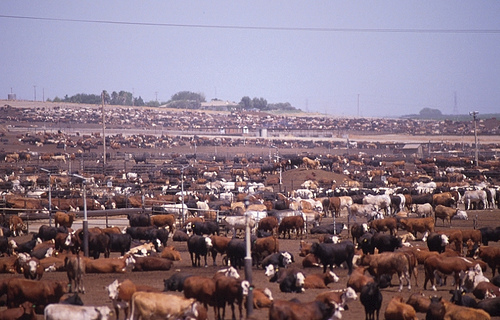 A major cause of global warming and pollution is livestock Already 40% of the of the worlds grains are fed to livestock, along with enormous amounts of water and energy. Meanwhile close to 1 billion people on the planet are starving. It seems inhumane for us to consume such large amounts of meat, while others starve. The livestock industry represents something that each and every one of us can change now, just by adopting a vegetarian diet. There are many meat substitutes today made from soy, that mimic the texture and flavour of meat, yet are far healthier on the body, produce much less pollution on the planet, and even costs less than animal flesh. The process of changing to a vegetarian diet is something we can all do now to reduce our ecological footprint on the planet. In fact switching to a vegetarian diet will save more greenhouse gases than switching to a hybrid car. 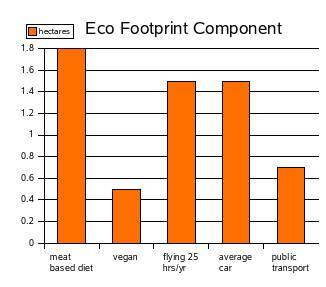 Changing from a meat based diet to a vegan one is the quickest way to stop global warming The process of making this change is simple, as each and every one of us has control over it, unlike the process of changing the energy sector, which involves billions of dollars of investment and mountains of bureaucracy at every level of government. The process of changing the transport sector is not much easier either, as all the planes, buses and truck are out of our control, and buying an eco-friendly car for ourselves is not cheap either. We therefore recommend the quickest way to mitigate the effects of global warming is for every person to adopt a plant based vegetarian diet. 1: A Simple Solution to Global Warming
Humanities desire for meat leads us to breed and eat 55 billion farm animals per year, a figure that is difficult to comprehend, and is having an absolutely devastating effects on the planet and also our health. 2: How to Go Green and Halt Global Warming
Eating a vegetarian diet would cut more than 50% of the U.S. consumption of oil and water and also rapidly slow or even stop global warming. The Meat-based diet worsens world hunger and is a primary cause of deforestation. A vegetarian approach to a green lifestyle can improve your health while enhancing the lives of everyone in the world. 3: Global Warming Facts and Quotes
If the future of the world depended on me, what would I do?
Ban Ki-moon: The hour is late, it’s time to decide. I’m quite confident that you will make the choice wisely. In addressing gl 4: Videos About Global Warming
The Effects, Cause and Solution to Global Warming
Interesting quotes by politicians and famous personages regarding global warming.
NASA Climate Report on Global Warming-Gerald Dicken Page 1 of 1 [1] |
|
||||
